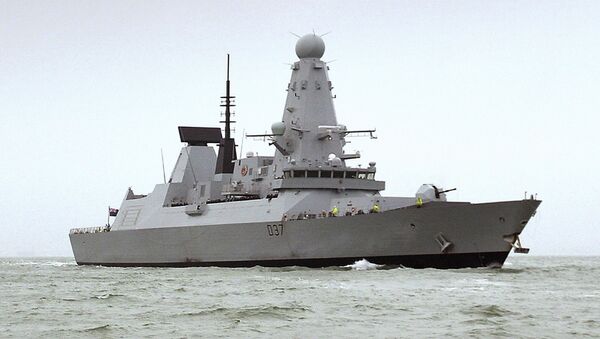The UK dispatched the warship HMS Kent to the Persian Gulf on Monday as part of the US-led Maritime Security Mission in the area.
The mission will see the Royal Navy working alongside the US Navy to purportedly ensure the security of merchant vessels in the Strait of Hormuz amid heightened political tension with Iran.
“Our focus in the Gulf remains firmly one of de-escalating the current tensions. But we are committed to upholding freedom of navigation and reassuring international shipping, which this deployment on operations aims to do,”said Andy Brown, the ship’s commanding officer.
The Kent will be relieving another British ship, the Duncan, which is already working in the region.
US-led Maritime Security Mission in Gulf
On 5 August Britain signed onto the US tanker escort mission, with UK officials stressing, however, that there was no change to London’s policy on Iran and that it would not be joining Washington’s sanctions targeting Tehran.
“It is vital to secure the freedom for all international shipping to navigate the Strait of Hormuz without delay, given the increased threat.The deployment of Royal Navy assets is a sign of our commitment to our UK flagged vessels and we look forward to working alongside the US and others to find an international solution to the problems in the Strait of Hormuz, " British Defence Secretary Ben Wallace said.
British Foreign Secretary Dominic Raab said:
“Our approach to Iran hasn’t changed. We remain committed to working with Iran and our international partners to de-escalate the situation and maintain the nuclear deal.”
The US Defense Department welcomed the UK decision.
As US-Iran tensions have been simmering against the backdrop of a number of volatile incidents in the Gulf, Washington suggested setting up an international coalition to ostensibly ensure maritime security in the region, inviting several European countries, including Germany, France, and the UK, along with other nations, such as Japan, South Korea, and Australia, to join.
When the US formally asked Germany to join the naval mission, Foreign Minister Heiko Maas stated that Germany sees "de-escalation and diplomatic efforts" as a priority. "Taking part in the American strategy of maximum pressure is out of the question," he was quoted as saying by the AFP news agency.
Senior lawmakers in both the SPD and Angela Merkel's CDU party also rejected the idea.
These developments come after Iran’s Islamic Revolutionary Guard Corps seized a British tanker, the Stena Impero, near the Strait of Hormuz for alleged maritime violations last month. That incident followed the UK marines seizing the Iranian oil tanker Grace 1 near Gibraltar on 4 July, accusing it of violating the European Union's sanctions against Syria.
US-Iran Tensions
US-Iranian tensions flared up last year,, when Washington unilaterally withdrew from the 2015 nuclear deal and reinstated crippling sanctions against Tehran.
On 8 May 2019, Iran announced the decision to partially discontinue its obligations under the deal.
The United States, in turn, stepped up its military presence in the Middle East in what White House National Security Adviser John Bolton called "a clear and unmistakable message to the Iranian regime", sending a carrier strike group, Patriot missiles, B-52 bombers and F-15 fighters to the area, according to the Pentagon.


